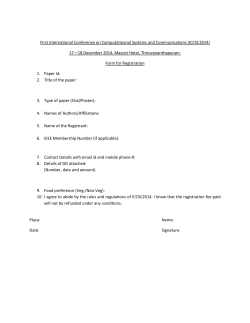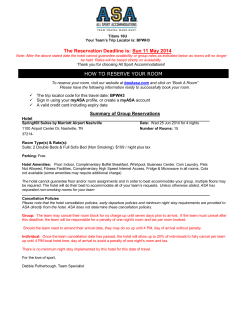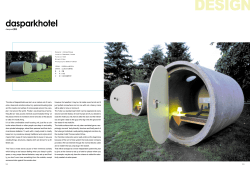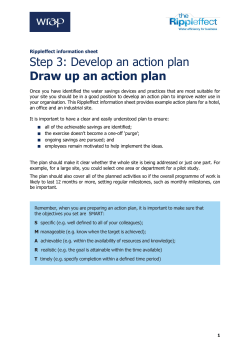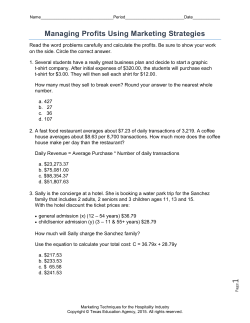
EHA 2015 Brochure
Economic History Association 75th Annual Meeting ● September 11-13, 2015 Nashville, Tennessee: Diversity in Economic History THE MEETING The theme for EHA 2015 is “diversity” in economic history. Diversity refers to differences in economic outcomes by race, ethnicity or tribal group, religion, location within countries (for example, urban vs. rural, or North vs. South), gender, and other attributes and how these evolve over the course of economic development. Papers documenting these differences in historical settings will be presented, as are papers that measure the impact of various institutions or government policies (for example, the Civil Rights Movement in the United States) or that examine long run trends in economic inequality more broadly construed. EVENTS OVERVIEW Friday Workshop and Tours One workshop and several local tour options are available for Friday morning, 8:00-Noon. Preregistration is required. Enrollment is limited to 40 participants for the workshop, and 30 participants for the tours. Sign up for a workshop or tour on the registration form. • Workshop: Job Market Tips and Tales. Newly hired PhD’s will share their job market experiences. • Tour 1: Nashville Public Library http:// www.library.nashville.org/locations/loc_main.asp). The main library is located right next to the conference hotel. The tour will feature displays of the Civil Rights Collection in particular. • Tour 2: The Hermitage (http://thehermitage.com/). The home of President Andrew Jackson. Transportation by bus from the conference hotel. • Tour 3: Country Music Hall of Fame (http:// countrymusichalloffame.org/). The Hall is within walking distance from the conference hotel. 2 Sessions – 5 Panels Commencing at 1:00 PM Poster Session (1:00-5:00 PM) Session: EHA 75 Years Old Reception A reception will be held at the Public Library (www.library.nashville.org/locations/ loc_main.asp). Graduate Student Dinner Saturday Teachers’ Breakfast (featuring a guest speaker. to be announced later) Historians’ Breakfast (featuring Leigh Gardner: “New frontiers in African Economic History: contributions of qualitative and quantitative research’“). Poster Session (All day) 2 Sessions – 6 Panels Women’s Lunch (co-organized by Simone Wegge and Juliette Levy) EHA Business Meeting Dissertation Session Plenary Session Presidential Address President Robert Margo will give his presidential address: “Obama, Katrina, and the Persistence of Racial Inequality”. Banquet Awards will be presented in the areas of best dissertations (Nevins and Gerschenkron prizes), best Journal of Economic History article of 2014 best Explorations in Economic History article of 2014, best book in European economic history, and excellence in teaching economic history. President’s Party and EHA 75th Celebration Sunday 2 Sessions – 5 Panels Adjourning at 12:00 PM. Meetings Coordinator Jari Eloranta, email: elorantaj@appstate.edu POSTER SESSION Graduate students will be disseminating preliminary results from their thesis in the poster session. The deadline for applications to the poster session has passed. Those accepted receive travel and hotel subsidies. GRADUATE STUDENT INCENTIVES All students are eligible for free hotel accommodation. The EHA will pay for 3 nights (double occupancy only). To apply, send an e-mail by July 1, 2015 to Jari Eloranta, elorantaj@appstate.edu, and include your name, school, and advisor’s e-mail address. For assistance with roommate matching, include your gender and other preferences. Students presenting papers or posters will receive travel subsidies as well as free hotel accommodation. The EHA will reimburse up to $500 for domestic flights and $800 for international flights. The deadline for receiving the group rate is August 10, 2015. *Note: Hotel space is always at a premium at the EHA meetings, so please reserve your room early to ensure availability. TRAVEL Information on all the travel options to the hotel can be found here: http://www.sheratonnashvilledowntown.com/. The closest airport is the Nashville International Airport: http://www.flynashville.com/. You can find ground transportation options here: https:// www.flynashville.com/ground-transportation. Discounted registration and banquet tickets. Another option is an airport shuttle. There are several companies that provide this kind of service. The EHA does not endorse any in particular—we urge you to look for them online. The official shuttle company of the airport is this one: http:// www.jarmontransportation.com/home.html. For more information on all incentives, see: http:// eh.net/eha/graduate-student-participation/ Parking at the hotel is $24 per day (self, $26 for valet) for conference attendees. ACCOMMODATIONS Book early to secure your preferred travel destination! The conference hotel is the Sheraton Downtown Nashville, in the heart of the city. SPECIAL REQUIREMENTS You can see all the specifics about the hotel here: http://www.sheratonnashvilledowntown.com/ Contact Jari Eloranta (elorantaj@appstate.edu) to make arrangements for vegetarian meals or other food requirements, or if you have special transportation or accommodation needs. The conference rate is $169 per night (single or double room), plus tax. SUPPORT FOR GRADUATE STUDENTS Free graduate student dinner Friday night. RESERVATION INSTRUCTIONS: To ensure the accuracy of your reservation, please make reservations in one of the following two ways. 1. By booking online through the following link: https://www.starwoodmeeting.com/events/ start.action?id=1505144836&key=2E057AEC 2. By calling Sheraton reservations at 1-888-6278565. Please be sure to request to book rooms with the Economic History Association 2015 Annual Conference to receive the discounted group rate. Please help support the next generation of scholars. Check the meeting Web site often for updates and announcements: http://eh.net/eha/economic-history-association-2015annual-meeting/ 2016 Economic History Association Meeting – September 16-18, 2016 – Boulder, Colorado President-elect Lee Alston will host the 2016 meeting at the Omni Interlocken hotel outside Boulder, Colorado. Program proposals will be due January 31, 2016 and can be submitted via the EHA Web site, eh.net/eha. Ann Carlos will chair the local arrangements committee and has already begun preparations. Further details about the conference will be announced in Nashville and posted to the Web site. Contact Jari Eloranta, elorantaj@appstate.edu, for more information. Meetings Coordinator Jari Eloranta, email: elorantaj@appstate.edu EHA ANNUAL MEETING PROGRAM Abstracts and links to papers will be available on the meeting website in August-September. FRIDAY, SEPTEMBER 11 Workshop & Local Tours: 8:00 AM – Noon Poster Session: 1:00 – 5:00 PM SESSION: Friday 1:00 – 2:30 PM 1: Race and Economic Outcomes in the First Half of the Twentieth Century Richard Baker (Vanderbilt University), ”School Resources and Labor Market Outcomes: Evidence from Early Twentieth-Century Georgia” William Collins (Vanderbilt University) and Marianne Wanamaker (University of Tennessee), “Intergenerational Mobility in the Shadow of Jim Crow” Tim Larsen (University of Colorado), “The Strange Career of Jim Crow: Labor Scarcity and Racial Treatment in the Postbellum South” 2: Innovation Michela Giorcelli (Stanford University), “The Effect of Management and Technology Diffusion on Firm Productivity: Evidence from the US Marshall Plan in Italy” Francesco Cinnirella (Ifo Institute, Munich), “Religious Diversity and Innovation: Evidence from Patenting Activity Elisabeth Perlman (Boston University), “Dense Enough To Be Brilliant: Patents, Urbanization, and Transportation in Nineteenth Century America Market Access” SESSION: Friday 3:00 – 4:30 PM 3: Finance and Housing Prices Jason Barr (Rutgers University) and Fred Smith (Davidson College), “What’s Manhattan Worth? A Land Value Index from 1950 to 2013” Katharina Knoll (Free University of Berlin), Moritz Schularick (University of Bonn), and Thomas Steger (University of Leipzig), “No Price Like Home: Global Housing Prices, 1870-1912” Ronan Lyons (Trinity College Dublin), “Measuring house prices in the long run: Insights from Dublin, 1900-2015” 4: Public Health Interventions Marcella Alsan (Stanford University) and Claudia Goldin (Harvard University), “Watersheds in Infant Mortality: The Role of Effective Water and Sewage Infrastructure, 1880-1915” Jonathan Fox (Freie Universitaet Berlin), “Origins and Effects of Rural Public Health Programs in North Carolina” W. Walker Hanlon (UCLA), “Pollution and Mortality in the Nineteenth Century” 5: Colonial Africa Jutta Bolt (University of Groningen) and Leigh Gardner (LSE), “De-compressing history? Precolonial institutions and Local Government Finance in British colonial Africa” Frederico Tadei (Bocconi University), “Extractive Institutions and Gains from Trade: Evidence from Colonia Africa” Marlous van Waijenburg (Northwestern University), “Financing the African Colonial State: The Revenue Imperative and Forced Labor” Session: EHA 75 Years Old: 4:45 - 6:15 PM Reception: 7:00 – 9:00 PM Graduate Student Dinner: 9:00 – 11:00 PM SATURDAY, SEPTEMBER 12 Historians’ Breakfast: 6:45 – 8:00 AM Teachers’ Breakfast: 6:45 – 8:00 AM Poster Session: 8:00 AM – Noon SESSION: Saturday 8:30 – 10:00 AM 6: Slave Owners in the Wake of Abolition Lisa D. Cook (Michigan State University), “The New National Lynching Data Set” Christian Dippel (UCLA) and Jean Paul Carvalho (UC Irvine), “The Iron Law of Oligarchy: The Post-Slavery Caribbean Sugar Colonies” Brandon Dupont (Western Washington University) and Joshua Rosenbloom (University of Kansas), “The Impact of the Civil War on Southern Wealth Mobility” 7: Off Wall Street: Finance and Banking in the 19th Century US Christopher Cotter (Vanderbilt University), “Railroad Failures and the Panic of 1873” Manuel Alejandro Bautista Gonzalez (Columbia University), “A City between Nations: Foreign and Domestic Currencies in New Orleans, Interregional and External Trade of the Antebellum South, 18561860” Haeilim Park (United States Treasury) and Jonathan Bluedorn (IMF), “Stopping Contagion with Bank Bailouts: Micro-Evidence from Pennsylvania Bank Networks during the Panic of 1884” 8: The Quantity-Quality Tradeoff in Historical Perspective Vincent Bignon (Bank of France) and Cecilia GarciaPenalosa (Aix-Marseille University and CESifo), “Protectionism and the Education--Fertility Tradeoff in Late 19th century France” Gregory Clark (UC Davis) and Neil Cummins (LSE), “The Child Quality-Quantity Tradeoff, England, 1750-1880: Is a Fundamental Component of the Economic Theory of Growth Missing?” Claude Diebolt (University of Strasbourg) and Faustine Perrin (Lund University), “Clio’s Role for Economic Growth: New Findings on the QuantityQuality Tradeoff in 19th Century France” EHA ANNUAL MEETING PROGRAM, cont’d. SESSION: Saturday 10:30 AM – 12:00 PM 9: Women in Marriage and Labor Markets Joyce Burnette (Wabash College) and Maria Stanfors (Lund University), “The Gender Gap in Turn of the Century Swedish Manufacturing” Martin Dribe (Lund University), Björn Eriksson (Lund University), and Francesco Scalone (University of Bologna), “Migration, Marriage and Social Mobility. Women in Sweden during Industrialization” Marc Goni (University of Vienna), “Assortative Matching and Persistent Inequality: Evidence from the World’s Most Exclusive Marriage Market” 10: Post-Colonial Africa Johan Fourie (Stellenbosch University) and Alfonso Herranz-Loncan (University of Barcelona), “The efficiency of Cape Colony railways and the origins of racial inequality” Sara Lowes (Harvard University) and Eduardo Montero (Harvard University), “Blood Rubber: The Effects of Labor Coercion on Development and Culture in the DRC” Johannes Norling (University of Michigan), “Family Planning and Fertility in South Africa under Apartheid” 11: Inequality in the Long Run Guido Alfani (Bocconi University) and Sergio Sardone (Bocconi University), “Long Term Trends in Economic Inequality in Southern Italy” Simon Wegge (College of Staten Island), “Inequality in Wealth: Evidence from Land Ownership in Mid-19th Century Germany” Se Yan (Peking University), “Civil Exams and Social Mobility: Jinshi’s Exam Performances and Official Careers in Ming China (1368-1644)” Women’s Lunch: Noon – 1:00 PM EHA Business Meeting: 1:00 – 2:00 PM Dissertation Session: 2:15 – 4:15 PM Plenary Session: 4:30 – 5.45 PM Presidential Address: 6:00 – 7:00 PM Cocktail Reception: 7:15 – 7:45 PM Banquet: 7:45 – 9:30 PM President’s Party and EHA 75th Celebration: 10 PM – 12 AM SUNDAY, SEPTEMBER 13 Poster Session: 8:00 – 10:30 AM SESSION: Sunday 8:30 – 10:00 AM 12: Institutions and Long-Term Development Carlos Alvarez-Nogal (Universidad Carlos III) and Christopher Chamley (Boston University), “Crecimientos: refinancing the Public Debt in Castile before 1600” Paul Dower, Eygeny Finkel, and Steven Nafziger (Williams College), “The Substitutability of Collective Action and Representation: Evidence from Russia’s Great Reforms” Dongwoo Yoo (West Virginia University), “Mapping and Economic Development: Spatial Information Matters” 13: Migration in Economic History Rowena Gray (UC-Merced), “Evaluating a Great Migration: Chain Migration and its Influence on Housing Prices in New York City, 1880-1950” Jason Long (Wheaton College) and Henry Siu (University of British Columbia), “Refugees from Dust and Shrinking Land: Tracking the Dust Bowl Migrants” James Siodla (Colby College), “Making the Move: The impact of the 1906 Disaster on Business Relocations and Industry Clustering” 14: Slavery: The Terms of Entrenchment Elena Esposito (European University Institute), “Side Effects of Immunities: the African Slave Trade” Conor Lennon (University of Pittsburgh), “The Impact of the 1850 Fugitive Slave Act on Slave Prices” Mohamed Saleh (Toulouse School of Economics), “The Cotton Boom, Slavery, and Land Inequality in the Nineteenth-Century Rural Egypt” SESSION: Sunday 10:30 AM – 12:00 PM 15: Transmission of Culture Vasilki Fouka (Universitat Pompeu Fabra), “Backlash: The Unintended Effects of Language Prohibition in US schools after World War l” Melinda Miller (U.S. Naval Academy), “Assimilation and Economic Performance: The Case of Federal Indian Policy” Felipe Valencia (Universitat Pompeu Fabra), “The Mission: Human Capital Transmission, Economic Persistence and Culture in South America” 16: U.S. Policy Effects in the Great Depression and World War II Daniel K. Fetter (Wellesley College) and Lee Lockwood (Northwestern University), “Meanstested Old Age Support and Private Behavior: Evidence from the Old Age Assistance Program” Sebastian Fleitas (University of Arizona), Price Fishback (University of Arizona), and Kenneth Snowden (University of North Carolina, Greensboro), “Why Does Recovery from Mortgage Credit Crises Take So Long? Institutional Causes of Delay in Liquidation of Troubled Building and Loans During the Great Depression” Taylor Jaworski (Queen’s University), “World War II and the Industrialization of the American South” CONFERENCE ENDS AT NOON. Economic History Association Annual Meeting – September 11-13, 2015 – Registration Register online June 1, 2015 onward at: http://eh.net/eha/economic-history-association-2015-annual-meeting/ Last Name: First Name: Department: School / Affiliation: Address: Address: Phone: FAX: E-mail: *Special Food Needs: Number of Tickets *Bringing a guest: Regular Price $ Student Price $ 100 40 Free Free 5 Free Friday – Tour 2, The Hermitage, 8:00 AM-Noon 15 Free Friday – Tour 3, Country Music Hall of Fame, 8:45 AM-Noon 15 Free Saturday – Historians’ Breakfast, 6:45-8:00 AM 20 4 Saturday – Teachers’ Breakfast, 6:45-8:00 AM 20 4 Saturday – Women’s Lunch 40 8 Saturday – President’s Banquet 65 15 Event Preregistration Fee (On-site registration fee, $125 / $50) Friday – Graduate Student Workshop, 9:00 AM-Noon Friday – Tour 1, Nashville Public Library, 10:00 AM-Noon Total $ Donation to Subsidize Graduate Student Participation – Optional $ TOTAL DUE: (Note! To become an EHA member, visit http://eh.net/eha/) Checks in USD payable to Economic History Association VISA, Mastercard, Diner’s Club, or American Express (circle one) Mail Form and Payment to: Jari Eloranta, EHA Meetings Office Card Number (Please print clearly) Dept. of History, Appalachian State University Anne Belk Hall, 224 Joyce Lawrence Lane Boone, NC 28608, USA Exp. Month/Year Signature Cancellation: Preregistration payments will not be refunded after September 1, 2015. Meetings Coordinator Jari Eloranta, email: elorantaj@appstate.edu
© Copyright 2025



